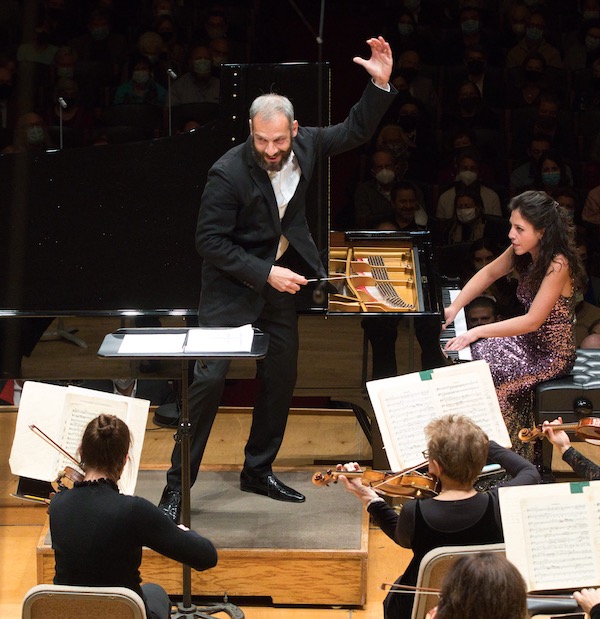Slobodeniouk, Rana bring fresh insights to familiar repertoire with BSO

Beatrice Rana performed Tchaikovsky’s Piano Concerto No. 1 with Dima Slobodeniouk conducting the Boston Symphony Orchestra Thursday night. Photo: Hilary Scott
Having devoted the first month of their season to some of the less-familiar corners of the repertoire, the Boston Symphony Orchestra returned to its bread-and-butter Thursday night.
To be sure, the concert that guest conductor Dima Slobodeniouk led at Symphony Hall could hardly have been more canonic: Piotr Tchaikovsky’s Piano Concerto No. 1 on the first half and Antonin Dvořák’s Symphony No. 7 following the interval.
Yet, when played with the right kind of purpose, this fare can take on a life all its own. And that’s largely what happened on Thursday.
Making her BSO debut in Tchaikovsky’s popular 1875 score was Beatrice Rana. Since netting the silver medal in the 2014 Van Cliburn Competition, the Italian pianist has emerged as a major artist.
This performance helped demonstrate why. Though she took a few bars to find her groove (partly on account of the instrument’s edgy tone), Rana’s account of the first movement’s big, dramatic moments was muscular and commanding: from the mighty opening chords to the driving runs in the coda, her playing easily carried through the hall. Still, there was no want of poetry or passion in her rapt take on the movement’s lovely second subject – or elfin whimsy in her playing of its scherzando theme.
Tonal sweetness, textural clarity, and some exquisite exchanges between the pianist and accompanimental orchestra solos were highlights of the central movement. Meanwhile, Rana imbued the impish middle part with conspicuous spunk and brio. Her playing in the finale’s wild passagework was brisk, nimble, and visceral—in short, thrilling.
For his part, Slobodeniouk drew playing of real polish from the BSO. Tempos moved smartly. Inner voices spoke pointedly.
Indeed, each movement was carefully balanced but never felt held back: the first’s famous opening theme, for instance, sang with great warmth but the BSO never covered Rana’s contributions. In the second, solo and ensemble textures were delicately handled. The finale overflowed with exuberant Slavic character.
The result was a highly characterful and invigorating Tchaikovsky First Concerto that made stimulative sense of the music’s thickets of notes and was marked by unaffected chemistry between pianist, orchestra, and audience.
Called back twice, Rana rewarded the rousing ovation with an encore of Debussy’s finger-busting Étude no. 6 (“Pour les huit doigts”).
The Dvořák Seventh Symphony that closed the night proved similarly dynamic.
On the one hand, Slobodeniouk’s interpretation of this 1885 favorite featured a remarkable attention to detail. From the downbeat of the first movement, textures were lucid, phrasings flexible, and dynamics discreetly terraced. Nuances of timbre were bracing—like the slow movement’s lovely blend of woodwind sonorities or the woozy transition to the Scherzo’s Trio, with its ominous, rumbling low-string writing. So was the conductor’s handling of the music’s thematic subtleties, nowhere more impressive than in the finale’s helter-skelter development.
At the same time, this was a Dvořák Seventh that never lost sight of either its musical line or the score’s latent sense of drama. In Slobodeniouk’s hands, the lyrical moments soared. The architecture of the outer movements—smartly directed and shaped—emerged naturally and potently. The orchestra’s second-movement playing was meltingly beautiful but never cloying or sentimental. And the Scherzo breathed swagger and elegance in equal measure.
Through it all, the BSO showcased a sensitivity of ensemble that hasn’t always been manifest this fall. Over the years, when the Boston Symphony is pushed in the right ways, it usually delivers. It did so, impressively, again on Thursday night.
The program will be repeated 1:30 p.m. Friday and 8 p.m. Saturday at Symphony Hall. bso.org.
Posted in Performances